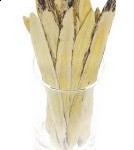by: Jennifer Dubowsky
Astragalus is actually a genus of a plant with over 2000 species. Its Chinese name, Huang qi, means “yellow leader” because this long yellow root is one of the most important herbs in Traditional Chinese Medicine (TCM) and commonly used as far back as the 1st century AD.
Astragalus is a great herb for fall as it helps your immune system prevent colds, allergies and the flu.
Its familiarity in the US may be attributed to extensive scientific study that began in the 1970s. Research has confirmed the herb's ability to cause minimal disruption to the body while normalizing body functions, no matter the condition or disease.
Astragalus is deservedly popular because it helps the body in a variety of ways. It stimulates the immune system so it is often used for treating the common cold and upper respiratory infections. Astragalus strengthens the body during periods of immune deficiency and is effective with allergies and in avoidance of the white blood cell deficiencies (leukopenia) that occur during chemotherapy. It also fights bacteria, viruses, and inflammation; it protects the liver, acts as a diuretic, benefits digestive functions, and treats disorders of the skin from burns to carbuncles. It is used in the treatment of hepatitis, chronic colitis, senility, cardiovascular diseases and AIDS and viral conditions because it increases interferon production and enhances NK and T-cell function. Finally, Astragalus can be used to promote the functions of several other herbs, such as Dan Shen (Salvia) and Dang Gui (Angelica sinensis root).
Astragalus is also used by itself, usually as a liquid extract, or a tea, Dosage depends on the application and form. When I was in Graduate school some of my professors would always add Huang Qi/Astragalus into their chicken soup stock.
- 6 cups water
- 1 tablespoon olive oil
- 1 onion diced
- 1 bulb garlic (at least 10 cloves)minced
- One 1 1⁄2 inch piece of fresh ginger root grated
- 1 1⁄2 cups vegetable soup stock (I prefer homemade chicken broth, make ahead & keep frozen)
- 5 pieces sliced dried Astragalus Root (find at an Asian grocery store or look for an online source)
- 2 cups fresh, sliced shiitake mushrooms
- 1 large reishi mushroom pinch of cayenne powder



The inclusion of onion, garlic & cayenne would be considered
an abomination by most of the Chinese that I know.
More likely companion ingredients would be foxberries, and
"phong ong" (not "dong quai", as has been mentioned in
other recipes by Occidentals ) which looks similar to ginseng root,
and more usually in a pork broth or beef consomme rather than
a chicken broth.